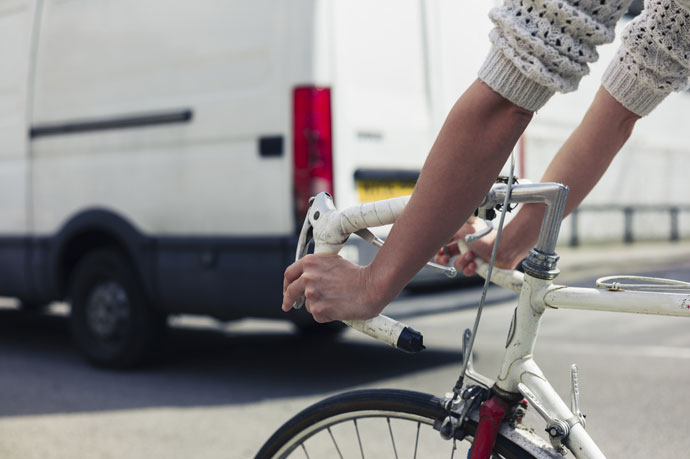
The Dutch bicycle manufacturer Vanmoof has reduced delivery damage to its bikes by up to 80 per cent by printing the image of a flat-screen TV on its boxes.
More than simply good lateral thinking, it hints at the psychology of cycling safety that’s at play on our roads.

Drivers pass closer when overtaking cyclists wearing helmets than when overtaking bare-headed cyclists, increasing the risk of a collision, found Dr Ian Walker, a traffic psychologist from the University of Bath. He used a bicycle fitted with a computer and an ultrasonic distance sensor to record data from over 2,500 overtaking motorists in Salisbury and Bristol.
He found that drivers were as much as twice as likely to get particularly close to the bicycle when he was wearing the helmet. Across the board, drivers passed an average of 8.5 cm closer with the helmet than without.
Dr Walker suggests the reason drivers give less room to cyclists wearing helmets is down to how cyclists are perceived as a group.
“We know from research that many drivers see cyclists as a separate subculture, to which they don’t belong. As a result, they hold stereotyped ideas about cyclists, often judging all riders by the yardstick of the Lycra-clad street-warrior. This may lead drivers to believe cyclists with helmets are more serious, experienced and predictable than those without. The idea that helmeted cyclists are more experienced and less likely to do something unexpected would explain why drivers leave less space when passing.”
If the fragility of a flat-screen TV encourages couriers to handle a box with more care, it seems the more vulnerable a cyclist appears, the more care is taken by a passing motorist.
Perhaps we should all be carrying a flat-screen TV monitor on our luggage racks.
So ingrained in our everyday day existence is a car culture, that most of us simply go along with the inverted hierarchy that sees pedestrians and cyclists enjoy the fewest rights on the road. Much has been written about the psychology that upholds this status quo. In his 1947 study of the ‘road deaths problem’, Murder Most Foul, former Chairman of the Pedestrians’ Association JS Dean’s asserts that roads are only dangerous by virtue of being filled with heavy, fast-moving motor vehicles, and consequently the greatest burden of responsibility for avoiding crashes, deaths and injury on the roads should lie with the motorist.
So it seems perverse that, to this day, road safety education concentrates not on the drivers of vehicles, but on those they have the potential to kill. Dean illustrated how placing responsibility for road danger on pedestrians and cyclists might lead, by stealth, to the placing of culpability on those groups – Murder Most Foul is a tirade against the placing of responsibility for road accidents on children.
As Dave Horton argues in his excellent article, Fear of Cycling, the dominant assumptions on which British road safety was originally based remain in place.
An onus on road safety rather than road danger reduction, a weak legal framework and under-funded road traffic law enforcement are just some of the things that foster a sense the invulnerability amongst car drivers. If the resulting inequality is redressed it must be challenged at every level and in every way.
Environmentally friendly cycle insurance
On the face of it, one cycle insurance policy is much like another, but the devil is the detail. How much excess you will be charged is just one of the things that varies wildly between providers. Another is so-called ‘new-for-old’ replacement – many insurers use this term, but if your bicycle is more than a few years old, devalue it severely. This means you are left out of pocket when you come to replace it. Read our insider guide to cycle insurance.
Furthermore, every cycle insurance policy you buy from us helps support the work of the ETA Trust, our charity campaigning for a cleaner, safer transport future.
ETA cycle insurance has a low standard excess of 5% (minimum £25) and offers a new-for-old for life – however old the bike if it’s stolen you get enough to buy a new model.
For 25 years we have been providing straightforward, affordable bicycle insurance. Whether you use your bike to commute, shop, race or amble in the park, ETA Cycle Insurance has you covered. We never devalue bikes no matter their age, allow you to buy your replacement bike wherever you like, replace stolen quick-release components and handle claims in-house.
The Good Shopping Guide voted us to be an ethical company like no other.
Peter S
What a shame your picture shows a bike with the back brake cable disconnected!
ETA
It’s a fixie!
Mark Kuramoto-Headey
I remember chatting with a Dane in Copenhagen. A bike continuing on the main road has priority over a car turning off the road. He said that any motorist who turns and hits a bike is – by default – assumed to be at fault. The result was that cycle injuries fell dramatically.
Jeremy Thorp
This is reinforced by repetition of the phrase “bikes are dangerous” when it is the cars that are dangerous, not the bikes. You would not say that mice were dangerous, it is the cats that are dangerous.